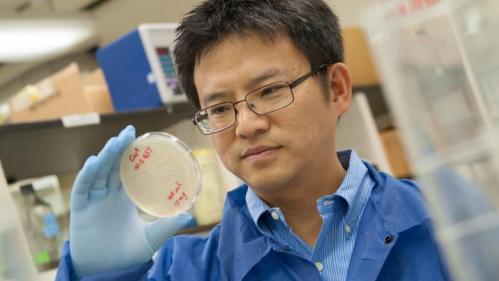Novel Rutgers-Developed Base Editing Technology to Become Available to Global Scientific Community Through Exclusive Partnership with Horizon Discovery Group

A novel base editing technology invented at Rutgers, The State University of New Jersey with the potential to be used for the creation of new cell and gene therapies will be made available to researchers worldwide through an exclusive partnership with the Horizon Discovery Group.
The technology invented by Shengkan ‘Victor’ Jin, associate professor of pharmacology, and co-inventor Juan C. Collantes, post-doctoral research fellow, at Rutgers Robert Wood Johnson Medical School can be potentially used for developing cell therapies for sickle cell anemia and beta thalassemia, HIV resistant cells for AIDS, off-the-shelf CAR-T cells for cancer, and MHC-compatible allogenic stem cells for transplantation. It could also be used as gene therapies for inherited genetic diseases such as antitrypsin deficiency and Duchenne muscular dystrophy.
“The gene editing technology developed by our researchers has the potential to revolutionize how scientists think about their search for better options and outcomes in the treatment of disease worldwide,” said S. David Kimball, PhD, Senior Vice President for Research and Economic Development at Rutgers University. “Just as important is our ability, through this significant partnership with Horizon Discovery Group, to share our discoveries and inventions with the scientific community around the world who are equally committed to improving human health.”
In January 2019, Rutgers University formed an exclusive partnership with Horizon to further the development of the proprietary base editing technology invented by Jin and Collantes. Since the initial partnership, Horizon, a global leader in the application of gene editing and gene modulation technologies, has been funding research in base editing at Jin’s laboratory. The company has now exercised its option to exclusively license the technology for commercialization of all therapeutic applications. This partnership places Rutgers among the front runners in the field of gene editing.
“The technology could have a significant impact in enabling cell therapies to be progressed through clinical trials and towards commercialization. Horizon is pleased to offer an effective and precise base editing technology and, alongside Rutgers, aims to make base editing available to all appropriate cell and gene therapy companies as well as research departments. Partnering with leading organizations will help us to drive innovation and deliver the best therapy for the patient,” stated Dr. Jonathan Frampton, Corporate Development Partner, Horizon Discovery.
Horizon has a number of internal programs designed to accelerate the clinical uptake of this technology and is now seeking partners to assess and shape the development of its Pin-point™ base editing platform. The company will offer partners access to a novel system that could be used to advance more effective multi-gene knockout cell therapy programs, with an improved safety profile, through clinical development. Partners will also gain access to the company’s expertise in genome engineering of different cell types, access to early technical data, and influence over the direction of future development.
“We intend to take full advantage of the unique modular and versatile features of the Pin-point platform and develop efficient gene inactivation agents for potential treatment of many devastating diseases where the leading causal contributing factors are well-defined. At the top of this disease list are Alzheimer’s disease, amyotrophic lateral sclerosis, and familial hypercholesterinemia,” said Jin.
Base editing is a novel technology for engineering DNA in cells, with the potential to correct certain errors or mutations in the DNA or inactivate disease-causing genes. Compared with currently available gene editing methodologies such as conventional CRISPR/Cas9, which creates “cuts” in the gene that can lead to adverse or negative effects, this new technology allows for accurate gene editing while reducing unintended genomic changes that could lead to deleterious effects in patients.



